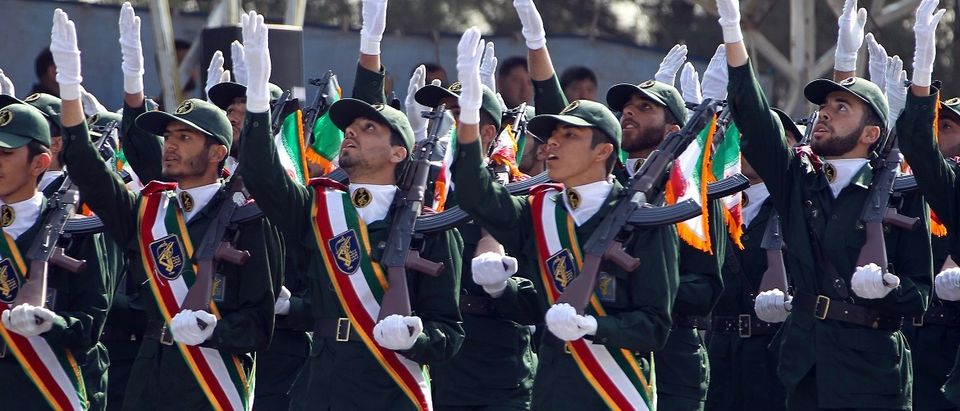It is a known fact that the Trump White House and Congress are weighing options of how to take action against Iran’s hostilities, especially the mounting belligerency of the Revolutionary Guards (IRGC), rendering escalated tensions between Iran and the U.S. in the Middle East to an unprecedented level.
“Iran poses the greatest long-term threat to stability for this part of the world,” said CENTCOM commander Gen. Joseph L. Votel at a Senate Armed Services Committee on Thursday.
U.N. Ambassador Nikki Haley further emphasized the threat posed by Iran in the region, underscoring how Syria cannot become a “safe haven for terrorists” and the importance of getting “Iran and their proxies out” of the Levant.
At such a sensitive timing, the National Council of Resistance of Iran (NCRI), known as the main Iranian opposition organization, staged a press conference on Tuesday in London exposing malign IRGC practices to cloak its efforts to continue fueling terrorism in the Middle East and expand smuggling activities.
The NCRI cited information obtained by sources affiliated with the People’s Mojahedin Organization of Iran (PMOI/MEK) inside Iran, and especially the IRGC apparatus, shedding light on the Guards owning 90 of Iran’s official 212 piers.
The IRGC employs these docks to transfer arms and ammunition, amongst other military ordinance, to proxy groups fighting to advance Iran’s interests across the Middle East. This policy of Iran procuring sensitive equipment to these groups is now a known fact considering the mullahs’ expanding influence.
Established in the Iranian regime’s early years, the then fledgling IRGC took on the task to launch a significant network of such piers. The intended objective was to provide means for the Guards to sidestep any domestic supervision, evade customs limitations and maintain international monitoring mechanisms at bay regarding its illegal activities.
Iranian Supreme Leader Ali Khamenei has remained loyal to this objective, tasking the IRGC under his watch to inflate the network of “Bahman Docks”, as they are known amongst regime institutions.
Misusing their leverage, the Guards jumped to the opportunity and established a decisive grip over the regime’s economy. A large percentage of Iran’s imports and exports are now literally controlled by the IRGC, using this leverage to flood the country’s market with low-priced goods and inflicting huge damage on local-based factories and trade.
The Guards now are reeling in $12 billion in annual profits through various methods of illegal transactions, according to reports. This renders an obvious conclusion that large portions of such revenue is directed to fund Iran’s backing of worldwide terrorism, meddling in the Middle East, nuclear program, ballistic missile drive, and the ongoing campaign by Tehran to get a hold of different weapons of mass destruction.
The NCRI has listed names and images of numerous IRGC docks and shipping companies, used as cover by Tehran to keep its true intentions in the dark. The Guards have also established ownership of a number of large oil tankers, rented to foreign states to funnel in further revenue.
The Iranian opposition — held yet another press conference, this time by the NCRI-US office in Washington, announcing a new publication, the Rise of the Revolutionary Guards’ Financial Empire: How the Supreme Leader and the IRGC Rob the People to Fund International Terror, focusing on the IRGC’s rising economic empire. American experts, including Ambassador Adam Ereli, were present to emphasize how Khamenei and the Guards have expanded their sphere of influence over Iran’s vast economic resources.
Tensions are currently growing between Washington and Tehran, specifically following the Trump administration placing Iran “on notice” in response to a January 29th intermediate-range ballistic missile launch, which in a failure and humiliation for the mullahs.
The troubles have escalated as Iran tested two short-range ballistic missiles last weekend, IRGC fast-attack boats harassed a U.S. Navy surveillance vessel on Thursday and successfully launched a naval missile hitting a target at a range of 250 kilometers.
The Trump administration, busy overhauling its predecessor’s destructive appeasement mentality, is evaluating the possibility of blacklisting the IRGC as a foreign terrorist organization. New revelations made by the Iranian opposition highlight the necessity of such a move.
Despite arguments otherwise, this designation of the IRGC will in fact de-escalate tensions in the flashpoint Middle East. As written in The Washington Post, U.S. President Donald Trump should not “miss the best opportunity we will have going forward to contain and defang Iran short of a war.”
Shahriar Kia is an Iranian dissident and a political analyst writing about Iran and the Middle East. He is the member of the Iranian opposition and he graduated from North Texas University. He tweets at @shahriarkia.


